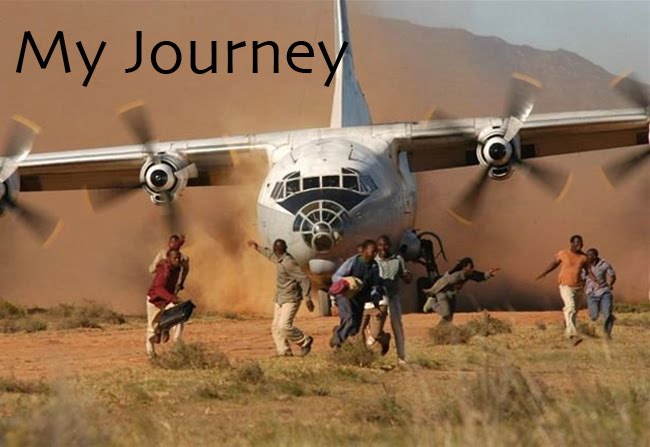
Somali Pirate
I relied substantially on an AP wire article for this posting by Todd Pitman and Katharine Houreld.
Today NATO/Dutch forces rescued twenty fishermen from pirates who launched the latest attack today, but then they let the pirates go because they had no authority to arrest/detain them. Please, somebody tell me what I'm missing here. I understand that I may not be bright enough to grasp the concept of freeing hostages and then releasing the pirates who seized them on the high seas. Pirates took a Belgian-flagged ship carrying 10 foreign crew near the Seychelles islands and have started hauling it toward Somalia today. AP reporters quoted London based piracy expert Roger Middleton who told them, "There isn't a silver bullet" to solve the problem. He said it's common for patrolling warships to disarm then free brigands because they rarely have jurisdiction to hold/try them. Middleton, the U.K.-based piracy expert, said NATO sees its "main role as deterring and disrupting pirate activity" — not prosecuting brigands. Pirates have attacked more than 80 boats this year alone, nearly four times the number assaulted in 2003, according to the Kuala Lumpur-based International Maritime Bureau. They now hold at least 18 ships and over 310 crew hostage, according to an Associated Press count. The first attack Saturday occurred in the pre-dawn darkness, when pirates hijacked the Belgian-flagged SS Pompei a few hundred miles (kilometers) north of the Seychelles, said Portuguese Lt. Cmdr. Alexandre Santos Fernandes, who is traveling with a NATO fleet patrolling further north in the Gulf of Aden. Belgium officials said the ship sounded three alarms indicating it was under attack as it headed toward the palm-fringed islands, a high-end tourist destination, with a cargo of concrete and stones. The dredging ship had 10 crew: two Belgians, one Dutch, three Filipinos and four Croatians, Fernandes said. As pirates steered the ship slowly northwest toward Somalia, 430 miles (700 kilometers) away, a Spanish military ship, a French frigate and a French scout ship all steamed toward the area to try to intercept it. In Brussels, government officials held an emergency meeting to discuss the situation and possible intervention. "There is no contact with the pirates, not with the crew, not with any other parties," Jaak Raes, director general of the Belgian Crisis Center, told reporters. "We are sure that the ship now is heading to the coast of Somalia." In a second attack later Saturday, pirates on a small white skiff fired small arms and rockets at a Marshall Islands-flagged tanker. Fernandes said the ship, the SS Handytankers Magic, issued a distress call shortly after dawn but escaped the pirates using "speed and maneuvers." The attack occurred in the Gulf of Aden, a vital short cut between Europe and Asia and one of the world's busiest shipping lanes. A Dutch frigate from the NATO force responded immediately to the distress call and trailed the pirates to a Yemeni-flagged fishing dhow the brigands had seized Thursday, Fernandes said. The bandits were using the Yemeni vessel as a "mother ship," a larger vessel that allows the pirates' tiny motorboats to hitch rides hundreds of kilometers off the Somali coast, greatly expanding their range. The pirates climbed into the dhow and Dutch marine commandos followed soon after, freeing 20 fishermen whose nationalities were not known. Fernandes said there was no exchange of fire and Dutch forces seized seven automatic weapons and one rocket-propelled grenade launcher. Pirates plucked from the sea by foreign militaries are being tried abroad. French soldiers take pirates who have attacked French citizens to Paris; pirates who have attacked other nations are hauled to Kenya, such as the 11 seized Wednesday when the French navy found them stalking a Lebanese-owned ship. India took 24 suspects to Yemen, since half were from there. The Dutch took five suspects to Rotterdam, where they probably will be tried next month under a 17th-century law against "sea robbery." And Wal-i-Musi, the Somali teen who was one of four pirates who tried to hijack the SS Maersk Alabama this month, will be sent to New York to face trial. The three other pirates with Wal-i-Musi were shot dead by U.S. Navy snipers who freed the ship's 53-year-old captain, Richard Phillips, in a dramatic rescue a week ago. The vast majority of detained pirates are set free to wreak havoc again because of legal barriers to prosecuting them. It can be difficult or impossible for prosecutors to assemble witnesses scattered across the globe and find translators. Many countries are wary of hauling in pirates for trial for fear of being saddled with them after they serve their prison terms. Why aren't they tried, hanged and then buried at sea in a weighted sack? |






1 comment:
The pirates haven't been very long on that ship. It's too clean.
Post a Comment